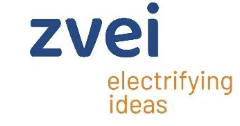- ZVEI expects production to decline by two per cent in 20
- Companies plan higher investments despite geopolitical concerns
“2023 was a pretty good year for the German electrical and digital industry overall,” said ZVEI President Dr Gunther Kegel, summing up the past year at the ZVEI’s annual kick-off press conference. “For the third time in a row, real, price-adjusted production increased – by 1.4 per cent based on figures up to and including November.” The industry has thus proven to be robust in a difficult environment. “However, it is also true that companies were still able to work off historically high order backlogs when new orders were already declining from the second quarter at the latest.” The industry’s nominal revenue reached a new record high of 242 billion euros last year (+8%).
Once again, the sector, which is heterogeneous in its composition, developed unevenly. The strongest growth in production was recorded by batteries (+7%), followed by electronic components (+6%), energy technology (+4%) and automation (+3%). Consumer durables, on the other hand, recorded a significant decline (- 13%). “It is pleasing that employment increased once again,” says Kegel. In Germany alone, the sector recently employed 910,000 people (+12,000 compared to 2022).
The electrical and digital industry is more globally positioned than almost any other sector. Exports (including re-exports) also increased again in 2023, by four per cent to 256 billion euros. More than half – 133 billion euros – remained in the European Union. “In view of growing geopolitical tensions, the European single market is becoming increasingly important,” explains the ZVEI President. “If the EU wants to continue to play an independent role between the USA and China, it must focus the internal market more consistently on growth and refrain from non-industry regulation such as the EU Supply Chain Act.” The next EU Commission must stop the regulatory tsunami and a bureaucracy that has been virtually unleashed in some areas and is weakening the competitiveness of companies. “We now need a European Union that focusses on industrial value creation,” demands Kegel. The ZVEI President clearly rejects a “dexit”: “Anyone who thinks that Germany could do better on its own reveals a dangerous lack of economic policy knowledge.”
In view of the current difficult economic environment with inflation, comparatively high interest rates and high energy prices, the ZVEI is cautious about 2024. Dr Kegel: “The industry is facing a dip in growth. We expect real production to fall by two per cent over the course of the year.”
A recent ZVEI member survey shows that companies in the electrical and digital industry remain firmly committed to Germany and Europe as an industrial location. Four out of five companies state that they prefer to invest in their own country. For more than half of them, Europe is an attractive investment location, but China is equally so. Overall, 60 per cent of companies want to increase their investment activity worldwide, although all companies rate the current geopolitical and political situation as uncertain. “Companies want to continue to take advantage of the opportunities that arise in this phase of industrial transformation,” explains Kegel, pointing out that the megatrends of electrification, digitalisation and automation remain intact. “We are the only major manufacturing sector where real production is now higher than before coronavirus.”
Strengthening key technologies in ecosystems
The electrical and digital industry’s expenditure on research and development (€22.1 billion) and investments (€9 billion) are also at record levels and above the pre-coronavirus level. Many of the more than 13,000 patents registered each year contribute to the three megatrends. “Our industry is well positioned when it comes to patents for green technologies, but is facing ever stronger competition from China,” says Wolfgang Weber, Chairman of the ZVEI Management Board. “In terms of industrial policy, ‘green tech’ is highly valued in China and is heavily subsidised by the state.”
In a world increasingly characterised by geopolitical considerations, Europe and Germany must prepare for a harsher economic policy climate. The ZVEI is calling for more courage from the EU and a much more open attitude towards innovation overall. “Our impression is that the EU is currently forging ahead with the use of artificial intelligence, especially in terms of regulation, and is not being precise enough. The current AI regulation threatens to become a massive brake on innovation, accompanied by unnecessary bureaucratic costs and a high degree of legal uncertainty for the industry.” The association sees it as positive that the EU is emphasising the strategic importance of key technologies in order to strengthen its technological sovereignty. It is important to act more in ecosystems. “A high-performance chip industry, for example, needs connection technology and electronics production,” says Weber. The global market share of these technologies has fallen sharply since 2000 and is now only three per cent for connection technology. “There are now too many dependencies. The production of such components must be categorised as eligible under the Net-Zero Industry Act.”
PDF in German language Download: https://euro-security.de/wp-content/uploads/2024/02/Faktenblatt-PK-Januar-2024-aktuell.pdf





